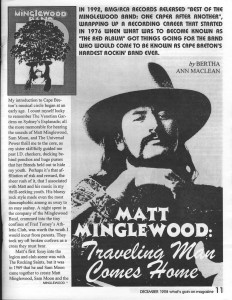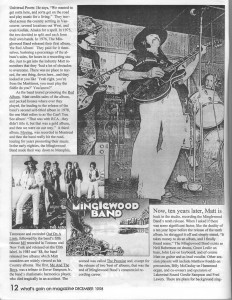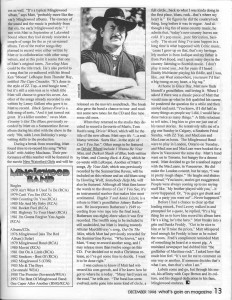
My introduction to Cape Breton’s musical circle began at an early age. I count myself lucky to remember The Venetian Gardens on Sydney’s Esplanade; all the more memorable for hearing the sounds of Matt Minglewood, Sam Moon, and The Universal Power thrill me to the core, as my sister skillfully guided me past I.D. checkers, ducking behind ponchos and huge purses that her friends held out to hide my youth. Perhaps it’s that affiliation of risk and reward, the sheer rush of it, that I associated with Matt and his music in my thrill-seeking youth. His bluesy rock style made even the most danceaphobic among us sway to an easy sashay. A night spent in the company of the Minglewood Band, crammed into the tiny confines of Fred Tomey’s Athletic Club, was worth the wrath I would incur from parents. They took my oft broken curfews as a cross they must bear.
Matt’s first foray into the legion and club scene was with The Rocking Saints, but it was in 1969 that he and Sam Moon came together to create Matt Minglewood, Sam Moon and the Universal Power. He says, “We wanted to get outta here, and sorta get on the road and play music for a living.” They traveled across the country settling in Vancouver, several locations out West, and even Kodiak, Alaska for a spell. In 1975, the two decided to split and each form their own bands. In 1976, The Minglewood Band released their first album, The Red Album. They paid for it themselves, bartering a percentage of the album’s sales, for hours in a recording studio. Just to get into the industry Matt remembers that they “had a lot of obstacles to overcome. There was no place to record, for one thing, down here…and they looked at you like `Yeah right, you’re from the Maritimes, you must play the fiddle do you?’ You know?”
As the band toured promoting The Red Album, Matt credits sales of the album, and packed houses where ever they played, for leading to the release of the band’s self-titled second album in 1978, the one Matt refers to as ‘the Can’t You See album’. “That was with RCA…they didn’t title it, but that was a gold album, and then we were on our way.” A third album, Moving, was recorded in Montreal and then the band really hit the road, touring for years promoting their music. In the early eighties, the Minglewood Band made their way down to Memphis, Tennessee and recorded Out On A Limb, followed by the band’s fifth release M5 recorded in Toronto and New York and released on the CBS label. In 1985 and ’88, the band released two albums which Matt considers are widely viewed as his Country albums. The first, Me And The Boys, was a tribute to Enver Sampson Jr., the band’s charismatic harmonica player, who died tragically in an accident. The second was called The Promise and, except for the release of two ‘best of’ albums, that was the end of Minglewood Band’s commercial recording career.

“It’s a typical Minglewood album,” says Matt, “probably more like the early Minglewood albums. The essence of the sound and the music is probably from that era, the early Minglewood style.” I met with Matt in September at Lakewind Sound where they had already recorded a couple of songs for the as yet unnamed album. Ten of the twelve songs they planned to record were either written by Matt or in collaboration with other songwriters and a few of these are already recorded including Matt’s original tune, “Traveling Man”, which was an early contender for the title track. He’s also partial to a song that he co-authored with his friend Ken “Moose” LeRoque from Thunder Bay, entitled “The Cape Crusader”. “It’s done in the style of ZZ Top…a real boogie tune.” Another of the songs already recorded is one written by Lennie Gallant who gave it to Matt to record. “Black Spruce River” is a folk-song of sorts, “And it just turned out great. It’s a killer number,” raves Matt. “Country’s Got The Blues”, previously recorded by Matt on a Summertime Revue album during his stint with the show in the early ’90s, adds Leon Dubinsky’s song-writing skills to the production.
During a break from recording, Matt found time to re-record his song “Whiz Kids” with Ashley MacIsaac. Their performance of this number will be featured in the movie New Waterford Girls and will be released on the movie’s soundtrack. The break also gave the band a chance to tour and road-test some new tunes for the CD and fine tune some old ones.
When they returned to the studio they decided to record a favourite of Matt’s, Tom Rush’s song “Drivin’ Wheel”, which will be the title of the new album. Matt says it’s “…a real bluesy version. Sorta like…in the style of Can’t You See.” Other songs to be featured on Drivin’ Wheel include “I Wanna Be Your Man”, and “Darkest Shade of Blue”, both written by Matt, and “Coming Back A King”, which he co-wrote with LeRoque. Another of Matt’s songs, “By Your Side”, which was previously recorded by the Summertime Revue, will be included on this release and an old blues song by Howling Wolf, “Somebody Help Me”, will also be featured. Although all Matt fans know the words to the chorus of “Can’t You See”, it’s an instrumental number that makes him most sentimental. “Hughie T and Annie Lizzie”, is a tribute to Matt’s grandfather Johnny Batherson. He incorporates Batherson’s 1949 recording from wire tape into the final track. Batherson was eighty-three when it was first recorded. The twelfth song to be included is still undecided, but Matt is leaning towards Allister MacGillivray’s song, “Out On The Mira”, which Matt had previously recorded for the Summertime Revue. “Who knows,” says Matt, “I may re-record another song, and I may release more than twelve songs on this CD. I’ve decided not to rush a Christmas release, so I’ve got some time to decide. I want it to be done right.”

At home in Glace Bay, Matt now finds himself a grandfather, and loving it. When I asked if there was a classic piece of Matt that would sum up what he felt qualified his career, he pondered the question for a while and then smiled and said, “You know, if I did half as many things as people say I did, I would have done twice as many things.” A little reluctant to tell tales, I beg him to give me just one of his tamer stories. He tentatively tells me of a gig one Sunday in Calgary, a Southern Fried Sunday, with ZZ Top, and MacLean and MacLean as hosts. The Minglewood Band were to play in London, Ontario on Tuesday, and MacLean and MacLean were booked for a show in Vancouver the same day. Matt’s band went on to Toronto, but hungry for a decent meal, Matt decided to go for a seafood supper with the MacLeans, in Vancouver. He did make the London concert, but he says, “I was in pretty rough shape.” He laughs and shakes his head, “You know, stories get exaggerated. People were always coming up to me saying stuff like, ‘My brother played with you,’…it never happened. Or, ‘You guys got drunk and what a party you went on!’…Never happened.”
Before I had a chance to clear up that leading remark, Fred Lavery walked in and prompted for a quote, he replied, “It’s a big thing for us to have him record his album here. He’s a king, he’s the hero.” Matt breaks into a grin and thanks Freddy. “Got to be nice to him or he’ll raise the prices,” Matt whispered loud enough for Freddy to hear as he exited the room. Fred’s compliment reminded Matt of something he heard at a recent gig. A mainland newspaper had dubbed him “the godfather of Maritime rock”. I asked how that made him feel. “It’s not for me to comment on one way or another. If someone decides that’s what I am, then that’s what I am.”
Labels come and go, but through his music, his affinity with Cape Breton and its culture, and his dogged dedication to his fans, Minglewood endures.

